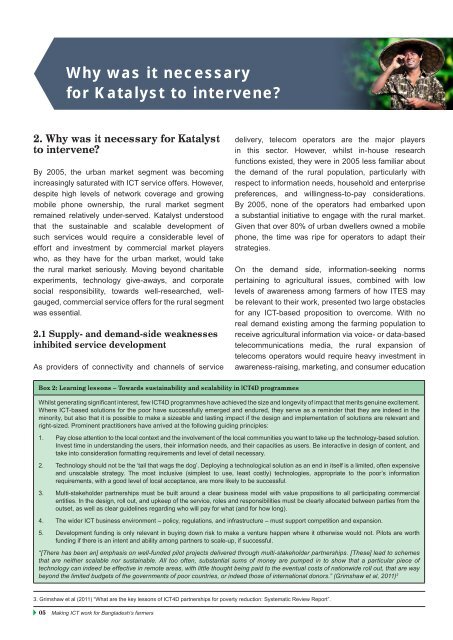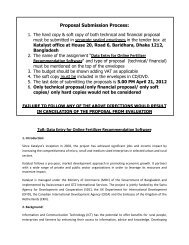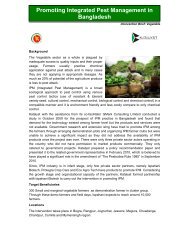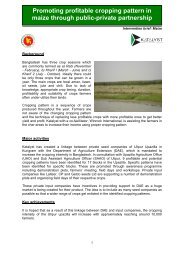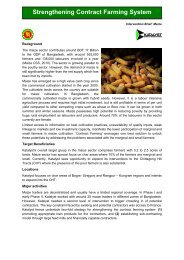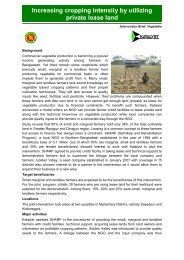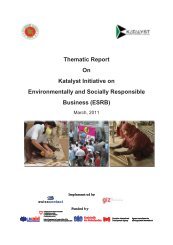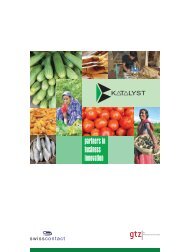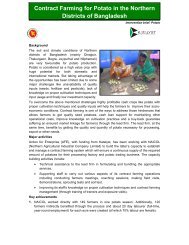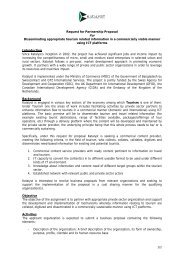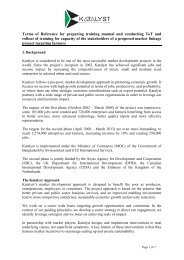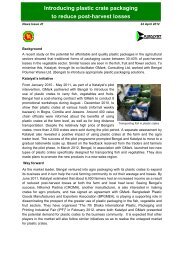Making ICT work for Bangladesh's farmers - Katalyst
Making ICT work for Bangladesh's farmers - Katalyst
Making ICT work for Bangladesh's farmers - Katalyst
Create successful ePaper yourself
Turn your PDF publications into a flip-book with our unique Google optimized e-Paper software.
Why was it necessary<br />
<strong>for</strong> <strong>Katalyst</strong> to intervene?<br />
2. Why was it necessary <strong>for</strong> <strong>Katalyst</strong><br />
to intervene?<br />
By 2005, the urban market segment was becoming<br />
increasingly saturated with <strong>ICT</strong> service offers. However,<br />
despite high levels of net<strong>work</strong> coverage and growing<br />
mobile phone ownership, the rural market segment<br />
remained relatively under-served. <strong>Katalyst</strong> understood<br />
that the sustainable and scalable development of<br />
such services would require a considerable level of<br />
ef<strong>for</strong>t and investment by commercial market players<br />
who, as they have <strong>for</strong> the urban market, would take<br />
the rural market seriously. Moving beyond charitable<br />
experiments, technology give-aways, and corporate<br />
social responsibility, towards well-researched, wellgauged,<br />
commercial service offers <strong>for</strong> the rural segment<br />
was essential.<br />
2.1 Supply- and demand-side weaknesses<br />
inhibited service development<br />
As providers of connectivity and channels of service<br />
delivery, telecom operators are the major players<br />
in this sector. However, whilst in-house research<br />
functions existed, they were in 2005 less familiar about<br />
the demand of the rural population, particularly with<br />
respect to in<strong>for</strong>mation needs, household and enterprise<br />
preferences, and willingness-to-pay considerations.<br />
By 2005, none of the operators had embarked upon<br />
a substantial initiative to engage with the rural market.<br />
Given that over 80% of urban dwellers owned a mobile<br />
phone, the time was ripe <strong>for</strong> operators to adapt their<br />
strategies.<br />
On the demand side, in<strong>for</strong>mation-seeking norms<br />
pertaining to agricultural issues, combined with low<br />
levels of awareness among <strong>farmers</strong> of how ITES may<br />
be relevant to their <strong>work</strong>, presented two large obstacles<br />
<strong>for</strong> any <strong>ICT</strong>-based proposition to overcome. With no<br />
real demand existing among the farming population to<br />
receive agricultural in<strong>for</strong>mation via voice- or data-based<br />
telecommunications media, the rural expansion of<br />
telecoms operators would require heavy investment in<br />
awareness-raising, marketing, and consumer education<br />
Box 2: Learning lessons – Towards sustainability and scalability in <strong>ICT</strong>4D programmes<br />
Whilst generating significant interest, few <strong>ICT</strong>4D programmes have achieved the size and longevity of impact that merits genuine excitement.<br />
Where <strong>ICT</strong>-based solutions <strong>for</strong> the poor have successfully emerged and endured, they serve as a reminder that they are indeed in the<br />
minority, but also that it is possible to make a sizeable and lasting impact if the design and implementation of solutions are relevant and<br />
right-sized. Prominent practitioners have arrived at the following guiding principles:<br />
1. Pay close attention to the local context and the involvement of the local communities you want to take up the technology-based solution.<br />
Invest time in understanding the users, their in<strong>for</strong>mation needs, and their capacities as users. Be interactive in design of content, and<br />
take into consideration <strong>for</strong>matting requirements and level of detail necessary.<br />
2. Technology should not be the ‘tail that wags the dog’. Deploying a technological solution as an end in itself is a limited, often expensive<br />
and unscalable strategy. The most inclusive (simplest to use, least costly) technologies, appropriate to the poor’s in<strong>for</strong>mation<br />
requirements, with a good level of local acceptance, are more likely to be successful.<br />
3. Multi-stakeholder partnerships must be built around a clear business model with value propositions to all participating commercial<br />
entities. In the design, roll out, and upkeep of the service, roles and responsibilities must be clearly allocated between parties from the<br />
outset, as well as clear guidelines regarding who will pay <strong>for</strong> what (and <strong>for</strong> how long).<br />
4. The wider <strong>ICT</strong> business environment – policy, regulations, and infrastructure – must support competition and expansion.<br />
5. Development funding is only relevant in buying down risk to make a venture happen where it otherwise would not. Pilots are worth<br />
funding if there is an intent and ability among partners to scale-up, if successful.<br />
“[There has been an] emphasis on well-funded pilot projects delivered through multi-stakeholder partnerships. [These] lead to schemes<br />
that are neither scalable nor sustainable. All too often, substantial sums of money are pumped in to show that a particular piece of<br />
technology can indeed be effective in remote areas, with little thought being paid to the eventual costs of nationwide roll out, that are way<br />
beyond the limited budgets of the governments of poor countries, or indeed those of international donors.” (Grimshaw et al, 2011) 3<br />
3. Grimshaw et al (2011) “What are the key lessons of <strong>ICT</strong>4D partnerships <strong>for</strong> poverty reduction: Systematic Review Report”.<br />
05<br />
<strong>Making</strong> <strong>ICT</strong> <strong>work</strong> <strong>for</strong> Bangladesh’s <strong>farmers</strong>


